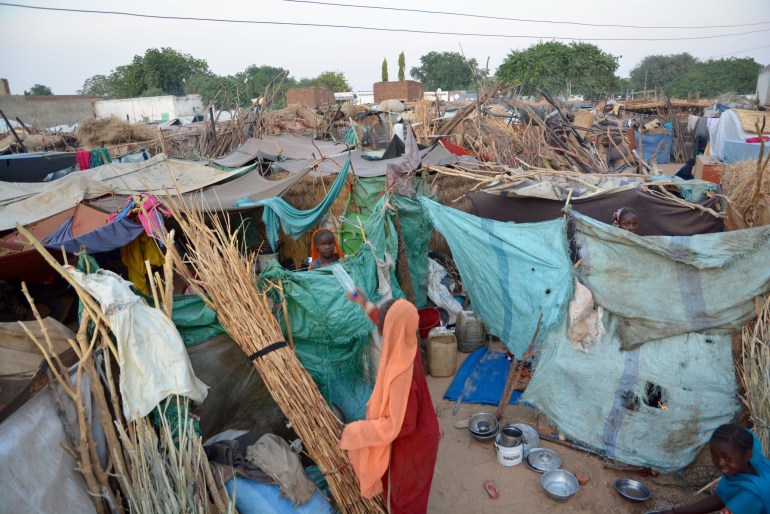Greater protections – but no way to access them
Illegal, dangerous routes far outpace resettlement slots from Chad, Libya or Tunisia. Only 1,100 refugees were resettled from Libya in 2023, out of some 60,000 registered by the UNHCR. Sudanese people still have to pay smugglers to cross the Sahara and the Mediterranean.
In February 2024, a boat with 42 Sudanese passengers sank off Tunisia. Two were rescued, and the others were reported dead or missing.
According to one of the survivors who spoke by phone to Al Jazeera, 38 passengers, including him, were Masalit from West Darfur, fleeing mass killings, and who ought to have qualified for asylum if they had managed to reach Europe.
A gathering site for displaced people near el-Geneina, West Darfur, where Masalit people have been facing severe violence [Jerome Tubiana/Al Jazeera]
In the Global North, some countries, like the United States or France, have shown more openness to granting Sudanese applicants asylum or at least temporary protection status. Since July, the French asylum court qualified large parts of Sudan, including Khartoum and most of Darfur, as suffering “a situation of blind violence of exceptional intensity”, giving applicants from those regions the right to immediate protection in France. Similar decisions have been taken in Belgium and the United Kingdom.
But European countries are still throwing resources at preventing the boat crossings.
Since 2017, European support for the Libyan Coast Guard has enabled the interception of up to 32,000 refugees and migrants a year.
Each time new routes have opened up, the EU has been quick to negotiate partnerships with transit countries to block them.
In July last year, for example, immediately after the violence in Sfax and the beginning of the ensuing pushbacks, the European Commission and some member states struck a $112m deal with Tunisia.
In March, Egypt was promised $215m in funding.
Those who do make it as far as northern France can expect long delays once they get there.
Despite all the dangers and obstacles ahead, a Sudanese man moves on from the transit camp of Adre in Chad, in hopes of reaching Europe [Jerome Tubiana/Al Jazeera]
Calais is a real bottleneck on the route: many Sudanese reach the town one or two months after leaving their country, then spend many more months on daily unsuccessful attempts to cross to the UK.
The morning before we met, as on every morning since he had arrived five months before, Issa attempted to board a truck to the UK. He jumped onto the moving vehicle at a roundabout, managed to climb onto the roof, opened the tarpaulin and slipped into the load.
The lorry boarded a ferry, but once it was on board, British police dogs located him. He was handed over to the French police, who detained him in Calais port’s police station for four hours.
Since 2020, tighter checks on the trucks have made the boats option more popular, but the Sudanese are said to seldom take the sea route just because they can’t afford the rates, which are much higher than on the Mediterranean.
“We don’t pay, no Sudanese pays,” Issa says. Some pretend to have paid, beg a place, agree to take the helm even if it means risking prison in the UK, where prosecutions often focus on the people identified as “captains” of the boats, or threaten to stab the boat with a knife if they’re not taken.
That night, Issa crept onto the beach and tried to smuggle himself onto a “plastic” (a dinghy). He had only tried the small boats five or six times before. “Sometimes we have to fight with the Afghans to board, but last night there was no violence,” he says.
The 25 mostly Afghan paying passengers allowed 15 Sudanese to join them. But the police intervened and stabbed the boat.
“We ran away,” says Issa. “Many others left last night, but we don’t know if they arrived.”
*Names have been changed to protect individuals’ anonymity.
